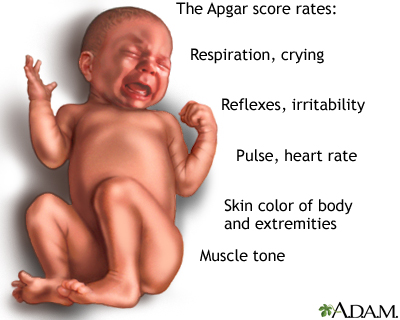

  |
The Apgar score is a test used to measure the vital signs of a baby at birth.

Virginia Apgar, M.D. (1909-1974) introduced the Apgar score in 1952. This test is a screening tool for health care providers to determine what assistance is immediately necessary to help a newborn stabilize.
The Apgar score is now used worldwide to quickly assess the health of an infant one minute and five minutes after birth. The 1-minute Apgar score measures how well the newborn tolerated the birthing process. The 5-minute Apgar score assesses how well the newborn is adapting to the environment.
At one and five minutes after your baby is born, the attending health care provider will assess five vital areas of newborn health. The Apgar score uses measures of 0, 1, or 2 for each category, with the best possible total score equaling 10.
A score of seven to 10 is normal and indicates your newborn is in good condition. A score of 10 is very unusual. Almost all newborns lose one point for blue hands and feet.
Any score less than seven indicates your baby needs assistance making the transition to life outside the womb. Health-care personnel should take appropriate action, for example, helping the infant breathe. The Apgar score may be repeated at 10 minutes and later to assess the effectiveness of the intervention or treatment.
Q: Does the Apgar score predict the future health of my baby?
A: In general the Apgar score alone does not predict the future health of the baby. A very low 5-minute Apgar score has been associated with a slight increased risk for cerebral palsy in full-term infants, but the vast majority of infants with low 5-minute Apgar scores do not develop CP.
Q: Does my child's Apgar score predict how smart he will be?
A: Apgar scores assess the health and well-being of an infant at birth. They do not predict a child's ability to perform well academically.
Q: I've seen APGAR written in all-caps. Isn't it an acronym?
A: The Apgar score was originally named after its creator, Virginia Apgar, M.D. After the Apgar score became standard, the categories were renamed to form the acronym APGAR: